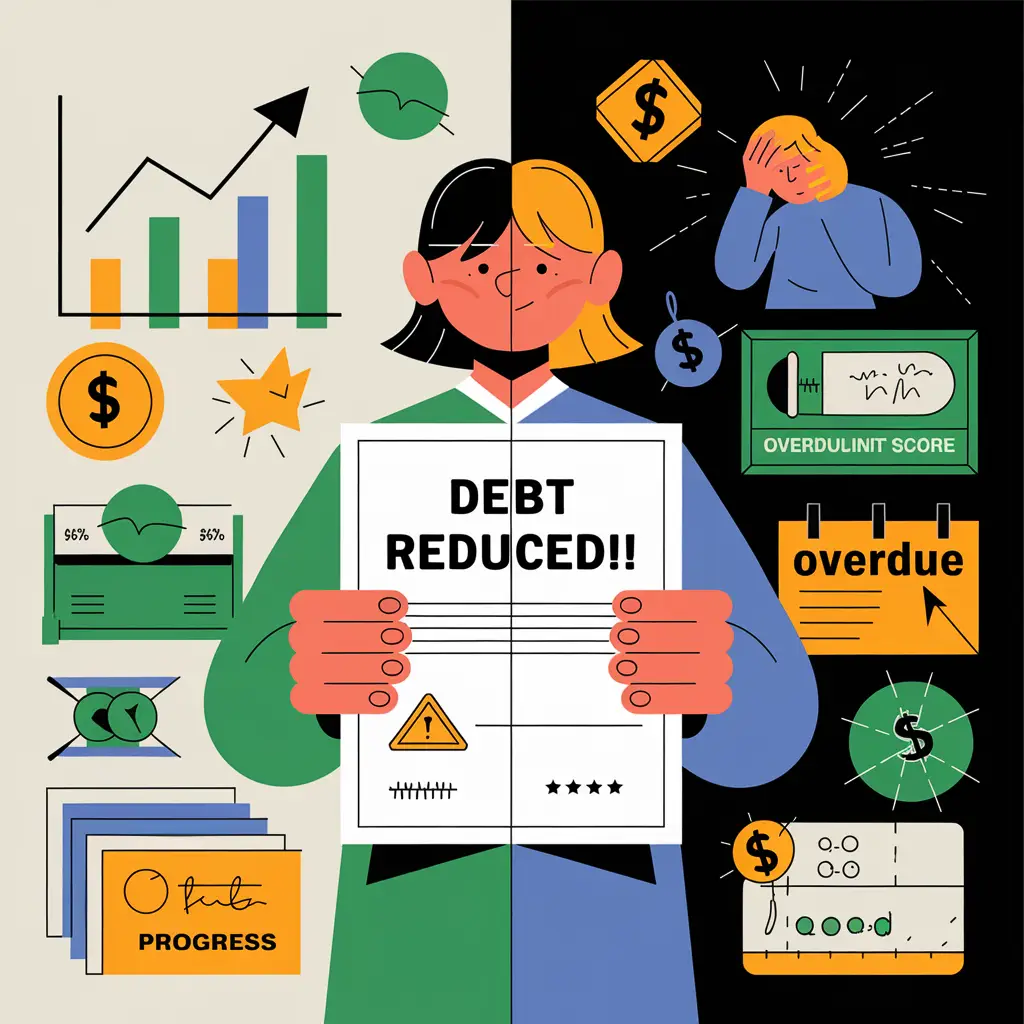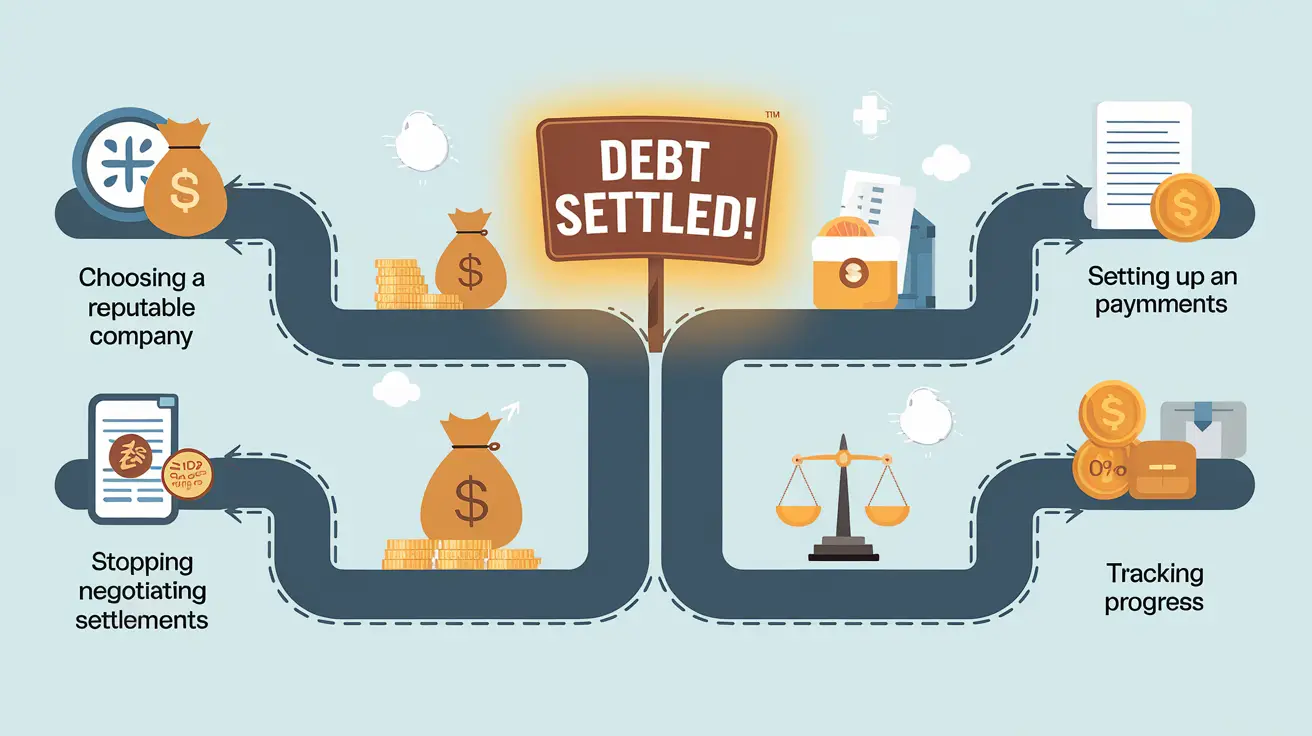Debt can be overwhelming This is especially true when it seems impossible for you to pay off your debt. You are not alone. Millions of people face the same challenges every day. What if there was a way to reduce debt? Retake control of your finances. and move towards a brighter financial future? In this guide, you’ll discover whether a debt repayment program might be the solution you’re looking for. Before enrolling in the program, we’ll break down what debt resolution is, how it works, the pros and cons, and things to consider. Ultimately, you’ll know to decide whether this option is right for you.
Grasping the Concept of Debt Settlement

A debt repayment program is a financial strategy designed to help an individual or business reduce outstanding debt by negotiating with creditors. These programs aim to pay off debt less than the full amount. This is a possible solution for those struggling with heavy debt.
When you enroll in a debt repayment program The first step is usually to stop paying your creditors. This can increase debt collection efforts and negatively impact your credit score. And instead of depositing money into a special account set up by the debt settlement company instead When you have accumulated enough money The company will begin negotiations with your creditors to receive a reduced lump sum payment.
Debt repayment programs are often used for unsecured debt, such as credit card debt and medical bills. It is not suitable for all types of loans, for example, secured debts such as mortgages or car loans. and certain unsecured debts, such as student loans and tax debt. There is generally no right to repay debt. This makes it important to identify the type of debt you have before considering this option.
In addition to understanding how these programs work, It is also important to consider the costs involved. Most debt settlement companies charge a fee. This is usually a percentage of the debt in repayment. These fees can increase. This makes it necessary to weigh against the potential savings from a reduced loan amount.
Debt settlement is often viewed as a last resort. This is because it has a major impact on your credit report. And there may be legal action from creditors who refuse to negotiate. Therefore, it is important to research carefully and consider all available options, such as debt consolidation or credit counseling. Before deciding whether debt settlement is the right choice for you,
Analyzing Your Financial Circumstances

It is important to carefully evaluate your financial situation before deciding to participate in a debt repayment program.
Start by estimating your total debt. This involves compiling a list of all your outstanding obligations. Including credit cards Personal loans and other debt The first step in understanding the full scope of your debt is whether debt repayment is the right solution for you.
Next, analyze your monthly income and expenses. Calculate your net income and compare your monthly expenses to see how much you can allocate to paying down debt. This analysis will help you determine if you can make your payments according to your debt repayment program.
Start by estimating your total debt. This involves compiling a list of all your outstanding obligations. Including credit cards Personal loans and other debt The first step in understanding the full scope of your debt is whether debt repayment is the right solution for you. Next, analyze your monthly income and expenses. Calculate your net income and compare your monthly expenses to see how much you can allocate to paying down debt. This analysis will help you determine if you can make your payments according to your debt repayment program.
Additionally, consider the impact on your credit report and possible legal action. Postponing payments to creditors as part of the debt settlement process increases collection efforts and can lower your credit score. You should be prepared for the possibility that some creditors may not agree to the agreement. This may result in legal action or ongoing collection efforts.
It is also important to research the costs involved. Most debt settlement companies charge a fee. This is usually a percentage of the debt that has been resolved. These fees can increase. This makes it necessary to weigh against the potential savings from a reduced loan amount.
By carefully reviewing your financial situation. Including all debts Monthly income and expenses and types of loans You’ll be able to make a more informed decision about whether a debt repayment program is the right choice for you…
Benefits and Drawbacks of Debt Settlement

Debt settlement has its advantages and disadvantages, and understanding these can help you make an informed decision.
A. Advantages of Debt Settlement
One of the primary benefits of debt settlement is the potential to reduce the total amount of debt you owe. This can make it easier to pay off your debts and potentially save you money in the long run. Additionally, debt settlement can provide a structured approach to becoming debt-free, which can alleviate the stress of managing multiple debts.
B. Disadvantages and Potential Risks
However, there are notable drawbacks to consider. Debt settlement will stay on your credit report for seven years, which can affect your ability to secure credit cards, loans, and even job applications. This can be a significant concern for those worried about long-term financial impacts. Additionally, there’s the risk that creditors may not agree to settle, and you could face tax consequences if the forgiven debt is considered taxable income.
C. Comparison to Alternative Debt Relief Options
When comparing debt settlement programs to other debt-relief options, such as debt consolidation or bankruptcy, it’s important to weigh the pros and cons carefully. Bankruptcy filings can remain on your credit report for seven years (Chapter 13) or even 10 years (Chapter 7). This longevity might influence your choice between settlement and bankruptcy.
Making a Well-Informed Choice

Before deciding to enroll in a debt repayment program A number of factors need to be considered to ensure it aligns with your financial situation and goals.
First, think about your ability to pay the program’s required payments. Missing payments can jeopardize the entire process and lead to additional financial problems. Evaluate whether you have a stable income that can be deposited into a special account designated by the debt settlement company.
Next, explore other options. in debt relief, debt consolidation, debt counseling, and even bankruptcy may be more appropriate. It depends on your situation. Weigh the pros and cons of each method to see which is the best solution for your credit situation.
Additionally, consider the long-term impact on your financial goals. This decision will affect your credit score. Ability to borrow money in the future Or even how to apply for a job? Debt payments stay on your credit report for up to seven years. This may have lasting consequences.
Researching professional debt settlement services is another important step. Look for a company with a strong track record and positive customer reviews. Make sure there is transparency about fees and procedures. This will help you avoid scams and ensure that you are working with a reputable company.
Finally, calculate any upcoming expenses that might affect your ability to stay on track with your schedule. Unexpected expenses, such as medical bills or home repairs It may affect your budget. This makes it difficult to adhere to the repayment plan. Plan for these potential expenses to avoid failure
By asking yourself these important questions and considering your unique financial situation. You’ll be able to make a more informed decision about whether a debt settlement program is the right choice for you.
Steps to Take if You Opt for Debt Settlement

When you decide that paying off debt is the right choice. Following a structured approach can help ensure a smoother experience.
A. Selecting a reputable debt settlement company
Start by researching and choosing a reliable debt settlement company. Look for a company with a solid reputation. This is confirmed by positive customer reviews and certifications from reputable industry organizations. Transparency is important Therefore, make sure that the company clearly explains the fees, processes, and potential risks.
B. Set up your unique account.
After selecting a company Basically, you need to set up a specific account where you will deposit funds. This account is used to store funds that the company will use to negotiate deals with your creditors. Make sure you understand how much money you need to deposit and how often. and track these payments.
C. Suspend direct payments to creditors.
In this process, You may be advised to exclude direct payments from creditors. Instead, your money goes into a dedicated account. Be prepared for increased collection attempts and a possible drop in your credit score.
D. Received news
Follow the progress of negotiations between debt settlement companies and lenders. Communicate with your company regularly to see which debts have been paid and which are still outstanding. Make sure you receive loan documents for each repayment.
E. Review your budget and adjust as needed.
During the debt repayment process Keep a close eye on your budget. Adjust expenses as necessary to be able to continue making necessary deposits. Consider creating a small emergency fund for unexpected expenses that could derail your payment plan.
F. Settlement inspection
Keep records of all settlements and outstanding balances. This will help you understand your progress and remaining responsibilities. Ask for written confirmation of each agreement to ensure there are no discrepancies later.
By diligently following these steps, you can navigate the debt repayment process more efficiently. This may help reduce your financial burden over time.
Recap of Main Points on Debt Settlement Programs

Debt repayment programs offer a potential solution to reducing large amounts of unsecured debt, such as credit card debt and medical bills. These programs work by negotiating with the lender to obtain a lump sum payment that is less than the total loan amount. Individuals will generally work with a settlement company to facilitate negotiations on their behalf.
This process often involves postponing payments to creditors. This can result in increased collection attempts and negatively impact your credit score. Instead of making payments directly to creditors Participants regularly deposit funds into a dedicated account managed by a settlement company. When enough money has been accumulated, the company will negotiate a compromise with creditors.
However, some loans may not be eligible for repayment. Secured debt, such as mortgages and car loans This includes some unsecured debt, such as student loans and tax debt, which generally cannot be repaid through these programs…
It is important to consider the costs associated with debt resolution. Most companies charge a fee which is a percentage of the loan that has been paid. Additionally, forgiven debt is considered taxable income. This leads to potential tax implications. Paying off debt can have a long-term effect on your credit report. They often stay there for up to seven years. This may affect your ability to apply for new or future loans. There is also a risk that some creditors may not agree to the terms. This may lead to ongoing charges or legal action.
When weighing the pros and cons of debt repayment programs It is important to explore other debt relief options, such as debt consolidation or debt counseling. To determine the best course of action for your financial situation. Thoroughly researching and evaluating these factors will help you make an informed decision about paying off debt.
Common Questions and Answers

Debt repayment programs are generally designed to deal with unsecured debt, such as credit card debt and medical bills. Secured loans, such as mortgages and car loans including government loans Generally not eligible for these programs.
The duration of the debt repayment process varies. This usually takes two to four years. This time frame depends on the total loan amount and your ability to make regular deposits into the designated account.
Paying off debt can have a negative effect on your credit score. This is because the process involves postponing payments to creditors. This can be reported to the credit information company. This results in a lower credit score. Moreover, the settled debt will be recorded on your credit report for seven years.
Most debt settlement companies charge a service fee. These fees are usually calculated as a percentage of the total loan. It’s important to understand these costs and factor them into your decision-making process.
Although it may be possible to negotiate repayment on your own. However many individuals choose professional services because of the experience and relationships these companies have with lenders. Professional negotiators can get better terms than those who are not familiar with the process.
Finally, there are potential tax implications to consider. Forgiven debt can be counted as taxable income by the IRS, which increases the tax burden for the year in which the debt was paid. It is recommended that you consult a tax professional to understand how debt repayment may affect your tax situation.
Good understanding of various fields These will help you better manage the complexities of your debt repayment program. and make decisions that align with your financial goals.

